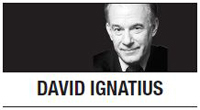[David Ignatius] What will come of HK's protests?
By David IgnatiusPublished : Sept. 19, 2019 - 16:38
 As tens of thousands of protesters marched down Hennessy Road toward government headquarters Sunday afternoon, chanting pro-democracy slogans and waving American flags, it was an exuberant celebration of this territory’s yearning for freedom.
As tens of thousands of protesters marched down Hennessy Road toward government headquarters Sunday afternoon, chanting pro-democracy slogans and waving American flags, it was an exuberant celebration of this territory’s yearning for freedom.The protesters seemed mindless of the danger: Men and women, young and old, ninja-clad teenagers and moms with their kids, all joined in the 15th straight weekend of protest. A doctor at a local hospital, a 56-year-old schoolteacher and a 19-year-old girl studying German, English and philosophy stopped to explain to me their chant, “Fight for freedom! Stand with Hong Kong!”
When the marchers passed a pro-Beijing newspaper office, they booed. Approaching the police headquarters, they raised their middle fingers and shouted insults, calling the cops gangsters and dogs. In the hot afternoon sun, they distributed blue fans imprinted with a cartoon of a frantic fish and the words “I thought water was a basic fish right ... and I thought freedom was a basic human right.”
Watching the Hong Kong protests is exhilarating in a world where democracy often seems in retreat and autocrats are on the rise. But I had a nagging fear, too. This idealistic, largely leaderless protest reminds me of the early days of the Arab Spring. That worries me. Without strong leadership, this movement could have a similar unhappy ending.
Sunday afternoon ended with a spasm of violence that’s a foreboding of trouble ahead. The hardcore protesters lingered outside the government offices on Harcourt Road while the other marchers moved on. Watching from an overpass 100 yards away, I could see the young would-be warriors crouching behind concrete barriers, cradling bricks and, it turned out, hidden petrol bombs -- which they soon began hurling toward the riot police.
As the petrol bombs torched trees and grass inside the government compound, the protesters cheered. The young radicals wanted a confrontation, and they eventually got one. Cannisters of tear gas were fired from nearby buildings, and a water cannon advanced, followed by baton-wielding riot police. (My thanks to Robert Godden and Jennifer Wang of Rights Exposure, a monitoring group, who provided me with protective gear so I could watch the drama unfold.)
It’s now more than 100 days since the pro-democracy protests began in early June. The South China Morning Post tallied the numbers: So far, there have been 2,414 rounds of tear gas fired and 1,453 people arrested. The economic impact is growing, too. Cathay Pacific, a local airline, reported a 38 percent slump in traffic in August compared with a year earlier; some hotels reported their occupancy rates falling to nearly half.
The democratic movement has deep roots here. At nearly every rapid-transit stop and public gathering place, there’s what’s known as a “Lennon Wall,” with graffiti, placards and personal protest notes. The authorities take down the messages, and by the next day, people have posted a new array. Last week, demonstrators gathered at shopping malls and other public places to sing their new anthem, “Glory to Hong Kong,” which proclaims: “Freedom shall shine upon us.”
Martin Lee, a human-rights activist who led democracy protests a generation ago and is now 81, tells me he sympathizes even with the militants who have used violent tactics. “For 35 years, I used peaceful means and they ignored me,” he says.
Where is this lovable but ill-defined movement heading? During a week in Hong Kong, I put that question to militant protesters and pro-Beijing government officials, as well as to local business leaders and media pundits. In several dozen conversations, I heard the same basic answer that Lee gave: “How will it end? I don’t know.”
It’s now a precarious stalemate: The Hong Kong government is weak and waging what amounts to a weekly standoff; Beijing is frustrated but seemingly doesn’t want to intervene militarily; the protesters have broad popular support but no leaders who could forge a pragmatic victory. A prominent former Hong Kong official told me he wants to negotiate with the young protesters, but in this amorphous, internet-based movement, he can’t find them.
What’s profoundly moving is that the Hongkongers are openly defying mainland China, which in 1997 promised “one country, two systems,” but is widely seen to have reneged.
A former official explains why he became disenchanted: “I thought we were on the same railway line. Hong Kong was ahead of the mainland, but we were headed to the same destination (of freedom). I don’t believe that anymore.”
This is a brave, noble movement. It needs leaders who can decide what success looks like, and seize it now, while they’re winning. The road darkens ahead.
By David Ignatius
David Ignatius can be reached via Twitter: @IgnatiusPost. -- Ed.
(Washington Post Writers Group)







![[KH Explains] How should Korea adjust its trade defenses against Chinese EVs?](http://res.heraldm.com/phpwas/restmb_idxmake.php?idx=644&simg=/content/image/2024/04/15/20240415050562_0.jpg&u=20240415144419)










![[Today’s K-pop] Stray Kids to return soon: report](http://res.heraldm.com/phpwas/restmb_idxmake.php?idx=642&simg=/content/image/2024/04/16/20240416050713_0.jpg&u=)